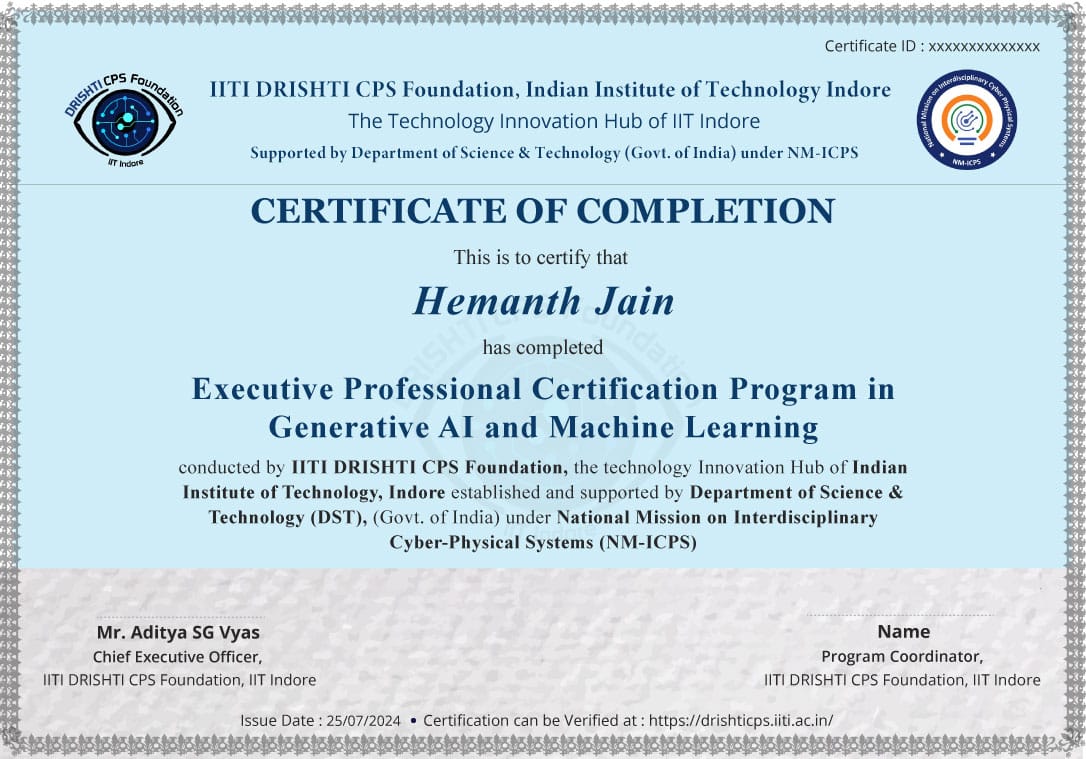Your cart is currently empty.







Elevate your career with our Executive Professional Certification in Generative AI & Machine Learning program, in collaboration with IITI DRISHTI CPS, IIT Indore in just 7 months
Learning Format
Online Bootcamp
Live Classes
7 Months
Campus Immersion
IIT Indore
IIT Indore DRISHTI CPS
Certification
EMI Starts
at ₹8000/month*
This Executive Professional Certification Program in Generative AI & Machine Learning helps you master all the relevant tools and techniques in the current Gen AI, and ML market.
About IIT Indore DRISHTI CPS
IIT Indore is the eighth IIT established in 2009 in India. IIT Indore DRISHTI CPS Foundation is a Technology Innovation Hub (TIH) setup at IIT Indore under the aegis of National Mission on Interdisciplinary Cyber-Physical Systems (NM-ICPS) with a focus on System Simulation, Modelling & Visualisation.
Achievements
Skills to Master
SQL
Natural Language Processing
Prompt Engineering
Data Science
ETL
Machine Learning
Deep Learning
Statistical Modeling
Generative AI
Transformers
Langchain
Tools to Master
SQL Fundamentals
Advanced concepts in SQL
User-Defined Functions in SQL
Optimization and Performance Using SQL
Introduction to Python
Basics of Python Programming
Object-Oriented Programming and Python
Data Handling with NumPy
Data Manipulation Using Pandas
Data Preprocessing
Data Visualization
Statistics and Descriptive Analytics using MS Excel
Python for Descriptive, Diagnostic, and Inferential Statistics
Getting Started with Machine Learning
Working with Regression
Working with Classification
Working with Clustering
Performing Text Mining, Cleaning, and Pre-processing
Working with Text Classification, NLTK, and Sentiment Analysis
Grasping Sentence Structure, Sequence Tagging, Sequence Tasks, and Language Modeling
AI Chatbots and Recommendations Engine
Fundamentals of Programming in Generative AI
Transformers
BERT
GPT
LLM
Recommendation: Chatbot Powered by Generative AI
Overview of Deep Learning
Overview of Neural Networks
Overview of the NN Framework
Introduction to Fully Connected NN
Introduction to Convolutional NN
Post Modeling Activities
Learning from Pre Built models
Recurrent Neural Networks
RBM and DBNs & Variational AutoEncoder
Object Detection Using Convolutional Neural Net
Projects are integral to your Executive Professional Certification Program in Generative AI & Machine Learning, ensuring you gain real-world experience and solidify your learning in these advanced fields.

Admission Details
The application process consists of three simple steps. An offer of admission will be made to selected candidates based on the feedback from the interview panel. The selected candidates will be notified over email and phone, and they can block their seats through the payment of the admission fee.
Submit Application
Tell us a bit about yourself and why you want to join this program
Application Review
An admission panel will shortlist candidates based on their application
Admission
Selected candidates will be notified within 1–2 weeks
Total Admission Fee
EMI Starts at
We partnered with financing companies to provide very competitive finance options at 0% interest rate
Financing Partners
![]()
Admissions close once the required number of students is enrolled for the upcoming cohort. Apply early to secure your seat.
| Date | Time | Batch Type | |
|---|---|---|---|
| Program Induction | 1st March 2026 | 08:00 PM - 11:00 PM IST | Weekend (Sat-Sun) |
| Regular Classes | 1st March 2026 | 08:00 PM - 11:00 PM IST | Weekend (Sat-Sun) |
In today’s era, a career in artificial intelligence (AI) and machine learning (ML) are in-demand careers, and hence, pursuing a program in ML and AI is worth it. Studying AI and ML gives you lots of job options. You could become an AI/ML engineer, a data scientist, or a research scientist. These roles often come with decent salaries and opportunities for career advancement.
You can apply for the following Generative AI & Machine Learning related job profiles:
| Job Role | Average Salary (India) | Average Salary (US) |
| Generative AI Model Developer | ₹800,000 – ₹1,500,000 | $90,000 – $130,000 |
| Generative AI Researcher | ₹1,000,000 – ₹2,000,000 | $100,000 – $180,000 |
| Natural Language Processing (NLP) Engineer | ₹1,200,000 – ₹2,200,000 | $120,000 – $220,000 |
| Computer Vision Engineer | ₹1,000,000 – ₹1,800,000 | $100,000 – $150,000 |
| Machine Learning Engineer | ₹1,500,000 – ₹2,500,000 | $140,000 – $200,000 |
Artificial Intelligence and Machine Learning Engineers create smart systems and programs. These systems learn from data and decide things autonomously. They can predict outcomes, and also, do many things, like understand languages, process visual information, and suggest things you might like. They solve hard problems using math and computers to improve lots of different jobs.
The scope is vast and promising. It offers exciting opportunities in fields like healthcare, finance, and tech. After completing this program, people can choose to be AI engineers, data scientists, or researchers. They work on cool projects to make smart systems. Lots of jobs are available, and there are many things to do, offering a great career in building the future of technology.
Yes, AI and ML are high-paying fields. They are in high demand across various industries, like technology, healthcare, and finance. Because these skills are needed by many companies, jobs in AI and ML offer good salaries, especially as you gain more experience.
No, programming language is not necessary to opt for this course. If you have a basic knowledge of programming language, then it can be helpful to understand the fundamentals of the course. We suggest you learn programming languages to become well-versed in AI and related topics.
Intellipaat offers learners the most updated, relevant, and high-value real-world projects in the respective training program. In this way, aspiring candidates can apply the knowledge they’ve gained in real-world industry settings. Each training includes multiple projects that extensively assess your skills, learning, and practical knowledge, ensuring you’re industry-ready.
Intellipaat provides placement assistance to all learners who have completed the training and moved to the placement pool after clearing the PRT (Placement Readiness Test). More than 500 top MNCs and startups hire Intellipaat learners. Our alumni work with Google, Microsoft, Amazon, Sony, Ericsson, TCS, Mu Sigma, and other renowned brands.
Intellipaat offers query resolution, and you can raise a ticket with the dedicated support team at any time. You can avail yourself of email support for all your queries. We can also arrange one-on-one sessions with our support team If your query does not get resolved through email. However, 1:1 session support is given for 6 months from the start date of your course.
What is included in this course?
 Click to Zoom
Click to Zoom















